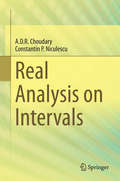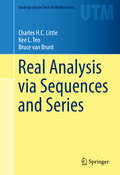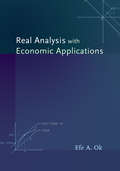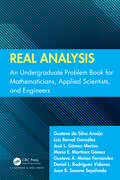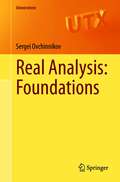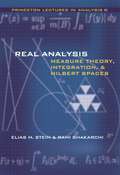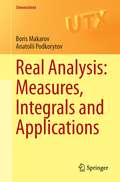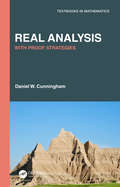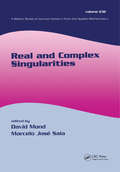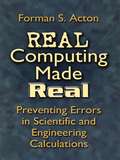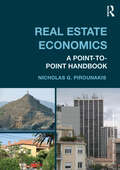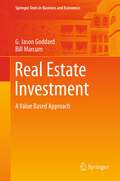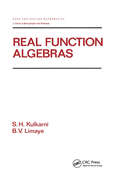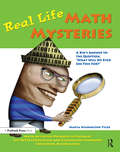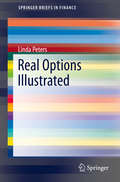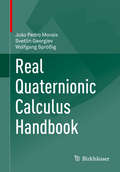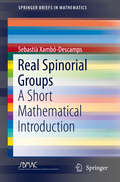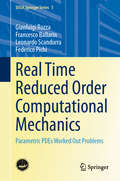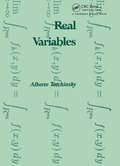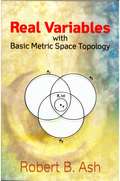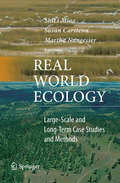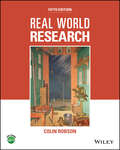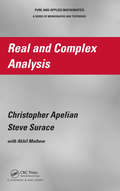- Table View
- List View
Real Analysis on Intervals
by A. D. R. Choudary Constantin P. NiculescuThe book targets undergraduate and postgraduate mathematics students and helps them develop a deep understanding of mathematical analysis. Designed as a first course in real analysis, it helps students learn how abstract mathematical analysis solves mathematical problems that relate to the real world. As well as providing a valuable source of inspiration for contemporary research in mathematics, the book helps students read, understand and construct mathematical proofs, develop their problem-solving abilities and comprehend the importance and frontiers of computer facilities and much more. It offers comprehensive material for both seminars and independent study for readers with a basic knowledge of calculus and linear algebra. The first nine chapters followed by the appendix on the Stieltjes integral are recommended for graduate students studying probability and statistics, while the first eight chapters followed by the appendix on dynamical systems will be of use to students of biology and environmental sciences. Chapter 10 and the appendixes are of interest to those pursuing further studies at specialized advanced levels. Exercises at the end of each section, as well as commentaries at the end of each chapter, further aid readers' understanding. The ultimate goal of the book is to raise awareness of the fine architecture of analysis and its relationship with the other fields of mathematics.
Real Analysis through Modern Infinitesimals
by Nader VakilReal Analysis Through Modern Infinitesimals provides a course on mathematical analysis based on Internal Set Theory (IST) introduced by Edward Nelson in 1977. After motivating IST through an ultrapower construction, the book provides a careful development of this theory representing each external class as a proper class. This foundational discussion, which is presented in the first two chapters, includes an account of the basic internal and external properties of the real number system as an entity within IST. In its remaining fourteen chapters, the book explores the consequences of the perspective offered by IST as a wide range of real analysis topics are surveyed. The topics thus developed begin with those usually discussed in an advanced undergraduate analysis course and gradually move to topics that are suitable for more advanced readers. This book may be used for reference, self-study, and as a source for advanced undergraduate or graduate courses.
Real Analysis via Sequences and Series
by Charles H.C. Little Kee L. Teo Bruce Van BruntThis text gives a rigorous treatment of the foundations of calculus. In contrast to more traditional approaches, infinite sequences and series are placed at the forefront. The approach taken has not only the merit of simplicity, but students are well placed to understand and appreciate more sophisticated concepts in advanced mathematics. The authors mitigate potential difficulties in mastering the material by motivating definitions, results and proofs. Simple examples are provided to illustrate new material and exercises are included at the end of most sections. Noteworthy topics include: an extensive discussion of convergence tests for infinite series, Wallis's formula and Stirling's formula, proofs of the irrationality of π and e and a treatment of Newton's method as a special instance of finding fixed points of iterated functions.
Real Analysis with Economic Applications
by Efe A. OkThere are many mathematics textbooks on real analysis, but they focus on topics not readily helpful for studying economic theory or they are inaccessible to most graduate students of economics. Real Analysis with Economic Applications aims to fill this gap by providing an ideal textbook and reference on real analysis tailored specifically to the concerns of such students. The emphasis throughout is on topics directly relevant to economic theory. In addition to addressing the usual topics of real analysis, this book discusses the elements of order theory, convex analysis, optimization, correspondences, linear and nonlinear functional analysis, fixed-point theory, dynamic programming, and calculus of variations. Efe Ok complements the mathematical development with applications that provide concise introductions to various topics from economic theory, including individual decision theory and games, welfare economics, information theory, general equilibrium and finance, and intertemporal economics. Moreover, apart from direct applications to economic theory, his book includes numerous fixed point theorems and applications to functional equations and optimization theory. The book is rigorous, but accessible to those who are relatively new to the ways of real analysis. The formal exposition is accompanied by discussions that describe the basic ideas in relatively heuristic terms, and by more than 1,000 exercises of varying difficulty. This book will be an indispensable resource in courses on mathematics for economists and as a reference for graduate students working on economic theory.
Real Analysis: An Undergraduate Problem Book for Mathematicians, Applied Scientists, and Engineers
by Juan B. Seoane Sepúlveda Gustavo Da Araújo Luis Bernal González José L. Merino María E. Gómez Gustavo A. Fernández Daniel L. VidanesReal Analysis: An Undergraduate Problem Book for Mathematicians, Applied Scientists, and Engineers is a classical Real Analysis/Calculus problem book. This topic has been a compulsory subject for every undergraduate studying mathematics or engineering for a very long time. This volume contains a huge number of engaging problems and solutions, as well as detailed explanations of how to achieve these solutions. This latter quality is something that many problem books lack, and it is hoped that this feature will be useful to students and instructors alike. Features Hundreds of problems and solutions Can be used as a stand-alone problem book, or in conjunction with the author’s textbook, Real Analysis: An Undergraduate Textbook for Mathematicians, Applied Scientists, and Engineers, ISBN 9781032481487 Perfect resource for undergraduate students studying a first course in Calculus or Real Analysis Contains explanatory figures, detailed techniques, tricks, hints, and “recipes” on how to proceed once we have a calculus problem in front of us.
Real Analysis: Foundations (Universitext)
by Sergei OvchinnikovThis textbook explores the foundations of real analysis using the framework of general ordered fields, demonstrating the multifaceted nature of the area. Focusing on the logical structure of real analysis, the definitions and interrelations between core concepts are illustrated with the use of numerous examples and counterexamples. Readers will learn of the equivalence between various theorems and the completeness property of the underlying ordered field. These equivalences emphasize the fundamental role of real numbers in analysis. Comprising six chapters, the book opens with a rigorous presentation of the theories of rational and real numbers in the framework of ordered fields. This is followed by an accessible exploration of standard topics of elementary real analysis, including continuous functions, differentiation, integration, and infinite series. Readers will find this text conveniently self-contained, with three appendices included after the main text, covering an overview of natural numbers and integers, Dedekind's construction of real numbers, historical notes, and selected topics in algebra. Real Analysis: Foundations is ideal for students at the upper-undergraduate or beginning graduate level who are interested in the logical underpinnings of real analysis. With over 130 exercises, it is suitable for a one-semester course on elementary real analysis, as well as independent study.
Real Analysis: Measure Theory, Integration, and Hilbert Spaces
by Elias M. Stein Rami ShakarchiReal Analysis is the third volume in the Princeton Lectures in Analysis, a series of four textbooks that aim to present, in an integrated manner, the core areas of analysis. Here the focus is on the development of measure and integration theory, differentiation and integration, Hilbert spaces, and Hausdorff measure and fractals. This book reflects the objective of the series as a whole: to make plain the organic unity that exists between the various parts of the subject, and to illustrate the wide applicability of ideas of analysis to other fields of mathematics and science. After setting forth the basic facts of measure theory, Lebesgue integration, and differentiation on Euclidian spaces, the authors move to the elements of Hilbert space, via the L2 theory. They next present basic illustrations of these concepts from Fourier analysis, partial differential equations, and complex analysis. The final part of the book introduces the reader to the fascinating subject of fractional-dimensional sets, including Hausdorff measure, self-replicating sets, space-filling curves, and Besicovitch sets. Each chapter has a series of exercises, from the relatively easy to the more complex, that are tied directly to the text. A substantial number of hints encourage the reader to take on even the more challenging exercises. As with the other volumes in the series, Real Analysis is accessible to students interested in such diverse disciplines as mathematics, physics, engineering, and finance, at both the undergraduate and graduate levels. Also available, the first two volumes in the Princeton Lectures in Analysis:
Real Analysis: Measures, Integrals and Applications
by Boris Makarov Anatolii PodkorytovReal Analysis: Measures, Integrals and Applications is devoted to the basics of integration theory and its related topics. The main emphasis is made on the properties of the Lebesgue integral and various applications both classical and those rarely covered in literature. This book provides a detailed introduction to Lebesgue measure and integration as well as the classical results concerning integrals of multivariable functions. It examines the concept of the Hausdorff measure, the properties of the area on smooth and Lipschitz surfaces, the divergence formula, and Laplace's method for finding the asymptotic behavior of integrals. The general theory is then applied to harmonic analysis, geometry, and topology. Preliminaries are provided on probability theory, including the study of the Rademacher functions as a sequence of independent random variables. The book contains more than 600 examples and exercises. The reader who has mastered the first third of the book will be able to study other areas of mathematics that use integration, such as probability theory, statistics, functional analysis, partial probability theory, statistics, functional analysis, partial differential equations and others. Real Analysis: Measures, Integrals and Applications is intended for advanced undergraduate and graduate students in mathematics and physics. It assumes that the reader is familiar with basic linear algebra and differential calculus of functions of several variables.
Real Analysis: With Proof Strategies (Textbooks in Mathematics)
by Daniel W. CunninghamTypically, undergraduates see real analysis as one of the most difficult courses that a mathematics major is required to take. The main reason for this perception is twofold: Students must comprehend new abstract concepts and learn to deal with these concepts on a level of rigor and proof not previously encountered. A key challenge for an instructor of real analysis is to find a way to bridge the gap between a student’s preparation and the mathematical skills that are required to be successful in such a course. Real Analysis: With Proof Strategies provides a resolution to the "bridging-the-gap problem." The book not only presents the fundamental theorems of real analysis, but also shows the reader how to compose and produce the proofs of these theorems. The detail, rigor, and proof strategies offered in this textbook will be appreciated by all readers. Features Explicitly shows the reader how to produce and compose the proofs of the basic theorems in real analysis Suitable for junior or senior undergraduates majoring in mathematics.
Real And Complex Singularities
by David Mond Marcelo José SaiaThis text offers a selection of papers on singularity theory presented at the Sixth Workshop on Real and Complex Singularities held at ICMC-USP, Brazil. It should help students and specialists to understand results that illustrate the connections between singularity theory and related fields. The authors discuss irreducible plane curve singularities, openness and multitransversality, the distribution Afs and the real asymptotic spectrum, deformations of boundary singularities and non-crystallographic coxeter groups, transversal Whitney topology and singularities of Haefliger foliations, the topology of hypersurface singularities, polar multiplicities and equisingularity of map germs from C3 to C4, and topological invariants of stable maps from a surface to the plane from a global viewpoint.
Real Computing Made Real: Preventing Errors in Scientific and Engineering Calculations
by Forman S. ActonEngineers and scientists who want to avoid insidious errors in their computer-assisted calculations will welcome this concise guide to trouble-shooting. Real Computing Made Real offers practical advice on detecting and removing bugs. It also outlines techniques for preserving significant figures, avoiding extraneous solutions, and finding efficient iterative processes for solving nonlinear equations.Those who compute with real numbers (for example, floating-point numbers stored with limited precision) tend to develop techniques that increase the frequency of useful answers. But although there might be ample guidance for those addressing linear problems, little help awaits those negotiating the nonlinear world. This book, geared toward upper-level undergraduates and graduate students, helps rectify that imbalance. Its examples and exercises (with answers) help readers develop problem-formulating skills and assist them in avoiding the common pitfalls that software packages seldom detect. Some experience with standard numerical methods is assumed, but beginners will find this volume a highly practical introduction, particularly in its treatment of often-overlooked topics.
Real Estate Economics: A Point-to-Point Handbook (Routledge Advanced Texts in Economics and Finance)
by Nicholas G. PirounakisReal Estate Economics: A point-to-point handbook introduces the main tools and concepts of real estate (RE) economics. It covers areas such as the relation between RE and the macro-economy, RE finance, investment appraisal, taxation, demand and supply, development, market dynamics and price bubbles, and price estimation. It balances housing economics with commercial property economics, and pays particular attention to the issue of property dynamics and bubbles – something very topical in the aftermath of the US house-price collapse that precipitated the global crisis of 2008. This textbook takes an international approach and introduces the student to the necessary ‘toolbox’ of models required in order to properly understand the mechanics of real estate. It combines theory, technique, real-life cases, and practical examples, so that in the end the student is able to: • read and understand most RE papers published in peer-reviewed journals; • make sense of the RE market (or markets); and • contribute positively to the preparation of economic analyses of RE assets and markets soon after joining any company or other organization involved in RE investing, appraisal, management, policy, or research. This book should be particularly useful to third-year students of economics who may take up RE or urban economics as an optional course, to postgraduate economics students who want to specialize in RE economics, to graduates in management, business administration, civil engineering, planning, and law who are interested in RE, as well as to RE practitioners and to students reading for RE-related professional qualifications.
Real Estate Investment: A Value Based Approach
by G Jason Goddard Bill MarcumThis book fills a gap in the existing resources available to students and professionals requiring an academically rigorous, but practically orientated source of knowledge about real estate finance. Written by a bank vice-president who for many years has practiced as a commercial lender and who teaches real estate investment at university level, and an academic whose area of study is finance and particularly valuation, this book will lead readers to truly understand the fundamentals of making a sound real estate investment decision. The focus is primarily on the valuation of leased properties such as apartment buildings, office buildings, retail centers, and warehouse space, rather than on owner occupied residential property.
Real Estate Modelling and Forecasting
by Chris Brooks Sotiris TsolacosAs real estate forms a significant part of the asset portfolios of most investors and lenders, it is crucial that analysts and institutions employ sound techniques for modelling and forecasting the performance of real estate assets. Assuming only a basic understanding of econometrics, this book introduces and explains a broad range of quantitative techniques that are relevant for the analysis of real estate data. It includes numerous detailed examples, giving readers the confidence they need to estimate and interpret their own models. Throughout, the book emphasises how various statistical techniques may be used for forecasting and shows how forecasts can be evaluated. Written by a highly experienced teacher of econometrics and a senior real estate professional, both of whom are widely known for their research, Real Estate Modelling and Forecasting is the first book to provide a practical introduction to the econometric analysis of real estate for students and practitioners.
Real Function Algebras
by S.H. Kulkarni B.V. LimayeThis self-contained reference/text presents a thorough account of the theory of real function algebras. Employing the intrinsic approach, avoiding the complexification technique, and generalizing the theory of complex function algebras, this single-source volume includes: an introduction to real Banach algebras; various generalizations of the Stone-Weierstrass theorem; Gleason parts; Choquet and Shilov boundaries; isometries of real function algebras; extensive references; and a detailed bibliography.;Real Function Algebras offers results of independent interest such as: topological conditions for the commutativity of a real or complex Banach algebra; Ransford's short elementary proof of the Bishop-Stone-Weierstrass theorem; the implication of the analyticity or antianalyticity of f from the harmonicity of Re f, Re f(2), Re f(3), and Re f(4); and the positivity of the real part of a linear functional on a subspace of C(X).;With over 600 display equations, this reference is for mathematical analysts; pure, applied, and industrial mathematicians; and theoretical physicists; and a text for courses in Banach algebras and function algebras.
Real Life Math Mysteries: A Kid's Answer to the Question, "What Will We Ever Use This For?" (Grades 4-10)
by Marya Washington TylerZookeeper, horse stable owner, archaeologist, lawyer, pilot, fireman, newspaper editor, dairy farmer, arson detective . . . these are just a few of the real people who, in their own words, share their own daily encounters with mathematics. How much lettuce does the Pizza Hut manager need to order for next week? How many rose bushes can a gardener fit around a wading pool? How many fire hoses will be needed to extinguish the fire? Your students will be amazed at the real-life math faced by truck drivers, disc jockeys, farmers, and car mechanics.Real Life Math Mysteries introduces students to math in the real world through a series of problems drawn from a vast array of community leaders, business professionals, and city officials. The problems are designed to stimulate students' creative thinking and teach the value of math in a real-world setting.Each concise and clear problem is provided on a blackline master and includes problem-solving suggestions for students with a comprehensive answer key. The problems are tied to the guidelines for math instruction from the National Council of Teachers of Mathematics. This book will get students thinking about the mathematics all around them.Make math last a lifetime. Students will delight in the real-life approach to math as they realize that they will use math skills over and over again in whatever vocation they choose. Make math an exciting experience that children realize will last a lifetime.More books that make math fun for students include Extreme Math, It's Alive!, and It's Alive! And Kicking!.Grades 4-10
Real Options Illustrated
by Linda PetersThis book explains the standard Real Options Analysis (ROA) literature in a straightforward, step by step manner without the use of complex mathematics. A lot of ROA literature is described through partial differential equations, probabilitydensity functions and simulation techniques, all of which may be unconvincing in the applicable qualities ROA possesses. Using this book, the reader will have a better grasp about how ROA works and will be able to provide his or her judgment about ROA, since all the basics, as well as its positive and negative qualities, are discussed. Real Options Illustrated provides practitioners with a real options framework and encourages readers to study the methodology using the in-depth explanations. This introduction to ROA is sufficient to equip readers with ROA basics, enabling them to perform future independent research. From this book, readers can judge whether ROA is of any value to their field.
Real Quaternionic Calculus Handbook
by João Pedro Morais Svetlin Georgiev Wolfgang SprößigReal quaternion analysis is a multi-faceted subject. Created to describe phenomena in special relativity, electrodynamics, spin etc. , it has developed into a body of material that interacts with many branches of mathematics, such as complex analysis, harmonic analysis, differential geometry, and differential equations. It is also a ubiquitous factor in the description and elucidation of problems in mathematical physics. In the meantime real quaternion analysis has become a well established branch in mathematics and has been greatly successful in many different directions. This book is based on concrete examples and exercises rather than general theorems, thus making it suitable for an introductory one- or two-semester undergraduate course on some of the major aspects of real quaternion analysis in exercises. Alternatively, it may be used for beginning graduate level courses and as a reference work. With exercises at the end of each chapter and its straightforward writing style the book addresses readers who have no prior knowledge on this subject but have a basic background in graduate mathematics courses, such as real and complex analysis, ordinary differential equations, partial differential equations, and theory of distributions.
Real Spinorial Groups: A Short Mathematical Introduction (SpringerBriefs in Mathematics)
by Sebastià Xambó-DescampsThis book explores the Lipschitz spinorial groups (versor, pinor, spinor and rotor groups) of a real non-degenerate orthogonal geometry (or orthogonal geometry, for short) and how they relate to the group of isometries of that geometry.After a concise mathematical introduction, it offers an axiomatic presentation of the geometric algebra of an orthogonal geometry. Once it has established the language of geometric algebra (linear grading of the algebra; geometric, exterior and interior products; involutions), it defines the spinorial groups, demonstrates their relation to the isometry groups, and illustrates their suppleness (geometric covariance) with a variety of examples. Lastly, the book provides pointers to major applications, an extensive bibliography and an alphabetic index.Combining the characteristics of a self-contained research monograph and a state-of-the-art survey, this book is a valuable foundation reference resource on applications for both undergraduate and graduate students.
Real Time Reduced Order Computational Mechanics: Parametric PDEs Worked Out Problems (SISSA Springer Series #5)
by Gianluigi Rozza Francesco Ballarin Leonardo Scandurra Federico PichiThe book is made up by several worked out problems concerning the application of reduced order modeling to different parametric partial differential equations problems with an increasing degree of complexity.This work is based on some experience acquired during lectures and exercises in classes taught at SISSA Mathematics Area in the Doctoral Programme “Mathematical Analysis, Modelling and Applications”, especially in computational mechanics classes, as well as regular courses previously taught at EPF Lausanne and during several summer and winter schools. The book is a companion for master and doctoral degree classes by allowing to go more deeply inside some partial differential equations worked out problems, examples and even exercises, but it is also addressed for researchers who are newcomers in computational mechanics with reduced order modeling. In order to discuss computational results for the worked out problems presented in this booklet, we will rely on the RBniCS Project. The RBniCS Project contains an implementation in FEniCS of the reduced order modeling techniques (such as certified reduced basis method and Proper Orthogonal Decomposition-Galerkin methods) for parametric problems that will be introduced in this booklet.
Real Variables (Pure And Applied Mathematics Ser. #Volume 123)
by Alberto TorchinskyA modern introduction to the theory of real variables and its applications to all areas of analysis and partial differential equations. The book discusses the foundations of analysis, including the theory of integration, the Lebesque and abstract integrals, the Radon-Nikodym Theorem, the Theory of Banach and Hilbert spaces, and a glimpse of Fourier series. All material is presented in a clear and motivational fashion.
Real Variables: with Basic Metric Space Topology
by Prof. Robert B. AshDesigned for a first course in real variables, this text presents the fundamentals for more advanced mathematical work, particularly in the areas of complex variables, measure theory, differential equations, functional analysis, and probability. Geared toward advanced undergraduate and graduate students of mathematics, it is also appropriate for students of engineering, physics, and economics who seek an understanding of real analysis.The author encourages an intuitive approach to problem solving and offers concrete examples, diagrams, and geometric or physical interpretations of results. Detailed solutions to the problems appear within the text, making this volume ideal for independent study. Topics include metric spaces, Euclidean spaces and their basic topological properties, sequences and series of real numbers, continuous functions, differentiation, Riemann-Stieltjes integration, and uniform convergence and applications.
Real World Ecology
by Susan Carstenn Martha Nungesser Shili MiaoEcological and environmental research has increased in scope and complexity in the last few decades, from simple systems with a few managed variables to complex ecosystems with many uncontrolled variables. These issues encompass problems that are inadequately addressed using the types of carefully controlled experiments that dominate past ecological research. Contemporary challenges facing ecologists include whole ecosystem responses to planned restoration activities and ecosystem modifications, as well as unplanned catastrophic events such as biological invasions, natural disasters, and global climate changes. Major perturbations implicated in large-scale ecological alterations share important characteristics that challenge traditional experimental design and statistical analyses. These include: * Lack of randomization, replication and independence * Multiple scales of spatial and temporal variability * Complex interactions and system feedbacks. In real world ecology, standard replicated designs are often neither practical nor feasible for large-scale experiments, yet ecologists continue to cling to these same standard designs and related statistical analyses. Case studies that fully elucidate the currently available techniques for conducting large-scale unreplicated analyses are lacking. Real World Ecology: Large-Scale and Long-Term Case Studies and Methods is the first to focus on case studies to demonstrate how ecologists can investigate complex contemporary problems using new and powerful experimental approaches. This collection of case studies showcases innovative experimental designs, analytical options, and interpretation possibilities currently available to theoretical and applied ecologists, practitioners, and biostatisticians. By illustrating how scientists have answered pressing questions about ecosystem restoration, impact and recovery, global warming, conservation, modeling, and biological invasions, this book will broaden the acceptance and application of modern approaches by scientists and encourage further methodological development.
Real World Research
by Colin RobsonREAL WORLD RESEARCH Provides students and practitioner alike with clear and systematic guidance on performing social research in applied settings Real World Research supplies the multidisciplinary skills necessary to conduct social research projects inside and outside of the classroom or the workplace. Offering well-balanced coverage of qualitative, quantitative, and mixed methods, this highly practical resource incorporates approaches from different social science disciplines to help readers find answers to real-life research questions in healthcare, education, business and management, and in many other public and private settings. Detailed yet accessible chapters include step-by-step advice for developing a research question, choosing a research design strategy, collecting and analyzing the data, interpreting and reporting the results, and more. The fifth edition contains timely coverage of contemporary methodologies, key ethical issues, and ongoing debates within the field of social research. New and expanded sections address topics such as evidence‐based approaches to social research, ethical considerations when conducting research involving people, carrying out projects based solely on existing research, and the importance and implications of internet-based research. Featuring a wealth of up-to-date examples drawn from a wide range of disciplines, this classic textbook: Focuses on useful real-world research in applied settings such as homes, schools, businesses, and other workplaces Provides a concise overview and a well-defined example of each main step of the research process Highlights the importance of collaboration, cooperation, and active participation in social research Explains flexible research designs using largely qualitative methods, including additional coverage of ethnographic and grounded theory approaches Includes an extensive companion website with numerous research examples, links to journal articles, PowerPoint slides, and many other additional resources Real World Research, Fifth Edition, remains essential reading for those tasked with developing, performing, and reporting the findings of a research project, including students, academics and educators, social scientists, health practitioners, and professionals in a diverse range of fields.
Real and Complex Analysis (Textbooks in Mathematics)
by Christopher Apelian Steve SuracePresents Real & Complex Analysis Together Using a Unified ApproachA two-semester course in analysis at the advanced undergraduate or first-year graduate levelUnlike other undergraduate-level texts, Real and Complex Analysis develops both the real and complex theory together. It takes a unified, elegant approach to the theory that is consistent with
